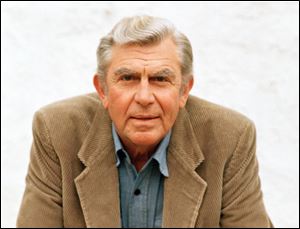
Beloved TV star who also excelled in movies dies at 86
7/4/2012
Actor Andy Griffith in Toluca Lake, Calif. Griffith, whose homespun mix of humor and wisdom made "The Andy Griffith Show" an enduring TV favorite, died Tuesday. He was 86.
RALEIGH -- Andy Griffith, who made homespun Southern wisdom his trademark as the wise sheriff in The Andy Griffith Show and the rumpled defense lawyer in Matlock, died Tuesday. He was 86.
Griffith died about 7 a.m. at his coastal home, Dare County Sheriff Doug Doughtie said in a statement.
"Mr. Griffith passed away this morning at his home peacefully and has been laid to rest on his beloved Roanoke Island," said Doughtie, reading from a family statement.
The family will release further information, the sheriff said.
He had suffered a heart attack and underwent quadruple bypass surgery in 2000.
Griffith's career spanned more than a half-century on stage, film, and television, but he would always be best known as Sheriff Andy Taylor in the television show set in a North Carolina town not too different from Griffith's own hometown of Mount Airy, N.C.
Griffith set the show in the fictional town of Mayberry, N.C., where Sheriff Taylor was the dutiful nephew who ate pickles that tasted like kerosene because they were made by his loving Aunt Bee, played by the late Frances Bavier. He was a widowed father who offered gentle guidance to son Opie, played by Ron Howard, who grew up to become the Oscar-winning director of A Beautiful Mind.
Griffith's "pursuit of excellence and the joy he took in creating served generations and shaped my life," Howard said via Twitter. "I'm forever grateful."
Don Knotts was the goofy Deputy Barney Fife, while Jim Nabors joined the show as Gomer Pyle, the unworldly, lovable gas pumper.
On Matlock, which aired from 1986 through 1995, Griffith played a cagey Harvard-educated defense attorney who was Southern-bred and -mannered with a practice in Atlanta.
In his rumpled seersucker suit in a steamy courtroom (air conditioning would have spoiled the mood), Matlock could toy with a witness and tease out a confession like a folksy Perry Mason.
The character -- law-abiding, fatherly, and lovable -- was much like Sheriff Andy Taylor with silver hair and a shingle.
In a 2007 interview Griffith said The Andy Griffith Show, which initially aired from 1960 to 1968, was seen somewhere in the world every day. A reunion movie, Return to Mayberry, was the top-rated TV movie of the 1985-86 season.
The Andy Griffith Show was a loving portrait of the town where few grew up but many wished they did -- a place where all foibles are forgiven and friendships are forever. Villains came through town and moved on, usually changed by their stay in Mayberry. That was all a credit to Griffith, said Craig Fincannon, who met Griffith in 1974.
"I see so many TV shows about the South where the creative powers behind it have no life experience in the South," Fincannon said. "What made The Andy Griffith Show work was Andy Griffith himself -- the fact that he was of this dirt and had such deep respect for the people and places of his childhood. A character might be broadly eccentric, but the character had an ethical and moral base that allowed us to laugh with them and not at them. And Andy Griffith's the reason for that."
Richard O. Linke, producer of the The Andy Griffith Show, said the show was "all Andy Griffith."
"We knew we had something. We knew there were other areas other than New York, Chicago, and L.A. We knew that the vast land of America, that this is what they would like," Linke said. "I used to say: If he's a hillbilly, he's the hippest hillbilly I ever met."
Griffith's career included stints on Broadway, notably No Time for Sergeants; movies such as Elia Kazan's A Face in the Crowd; and records. He was inducted into the Academy of Television Arts Hall of Fame in 1992 and in 2005, he received the Presidential Medal of Freedom, one of the country's highest civilian honors.
The Andy Griffith Show was one of only three series in TV history to bow out at the top of the ratings. (The others were I Love Lucy and Seinfeld.) Griffith said he decided to end it "because I thought it was slipping, and I didn't want it to go down further."
When asked in 2007 to name his favorite episodes, the ones atop Griffith's list were the shows that emphasized Knotts' character. Griffith and Knotts had become friends while performing in "No Time for Sergeants," and remained so until Knotts' death in 2006 at 81.
"The second episode that we shot, I knew Don should be funny and I should play straight for him," Griffith said. "That opened up the whole series because I could play straight for everybody else. And I didn't have to be funny. I just let them be funny."
Letting others get the laughs was something of a role reversal for Griffith, whose career took off after he recorded the comedic monologue What It Was, Was Football.
That led to his first national television exposure on The Ed Sullivan Show in 1954, and the stage and screen versions as the bumbling draftee in No Time for Sergeants.
In the drama A Face in the Crowd, he starred as Larry "Lonesome" Rhodes, a local jailbird and amateur singer who becomes a homespun philosopher on national television. As his influence rises, his drinking, womanizing, and lust for power are hidden by his handlers.
"Mr. Griffith plays him with thunderous vigor," the New York Times wrote. Said the Washington Post: "He seems to have one of those personalities that sets film blazing."
His role as Sheriff Taylor seemingly obliterated Hollywood's memory of Griffith as a bad guy. But then, after that show ended, he found roles scarce until he landed a bad-guy role in Pray for the Wildcats.